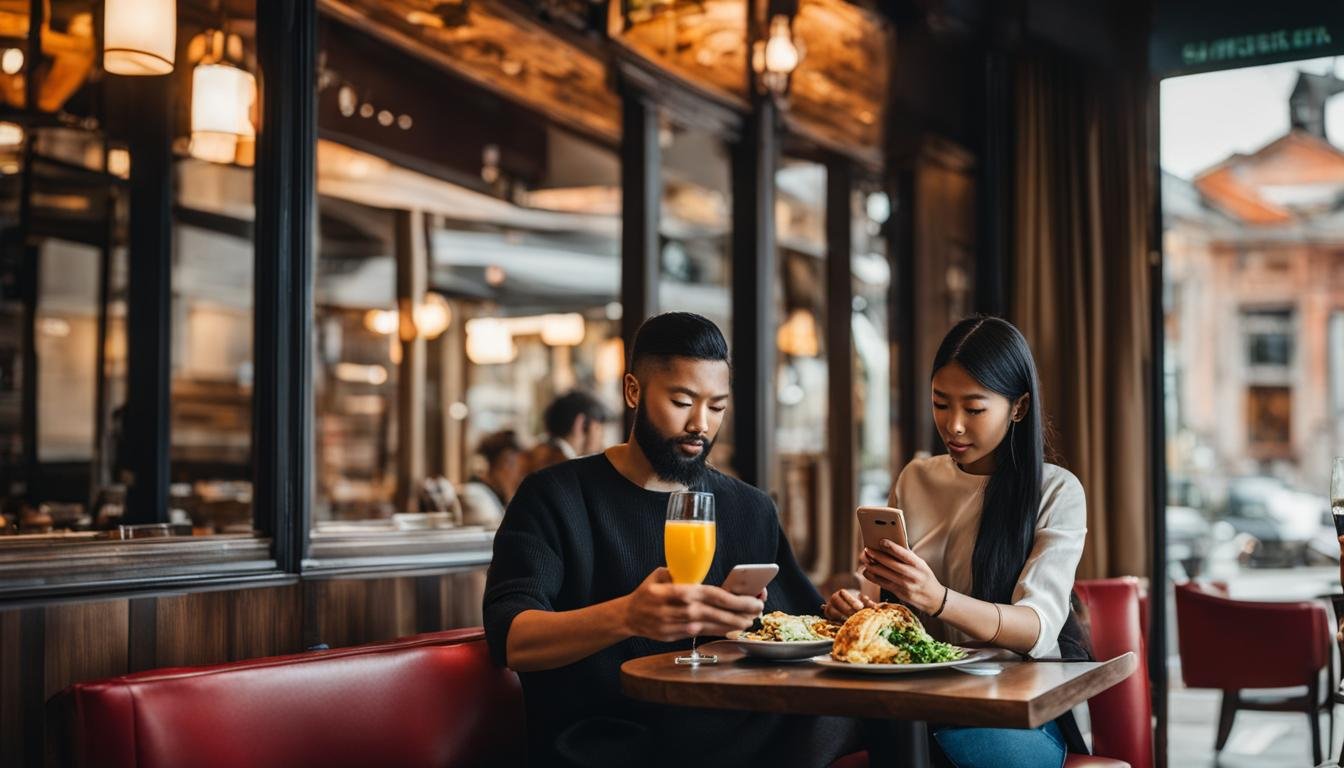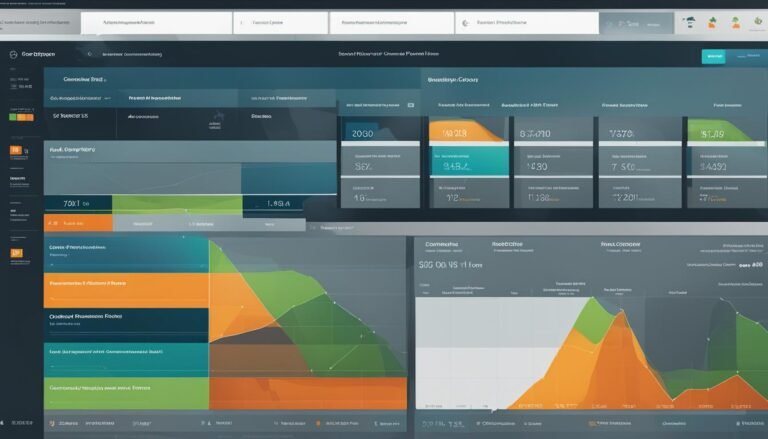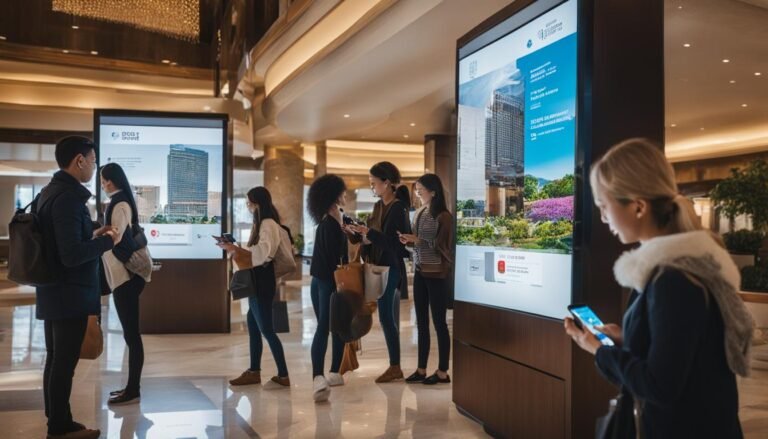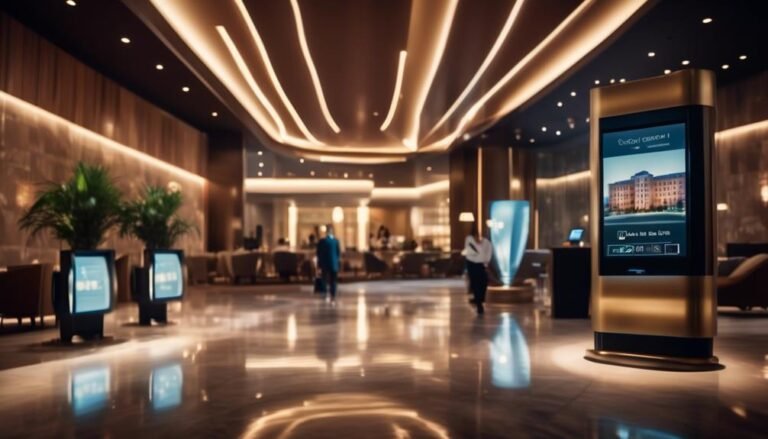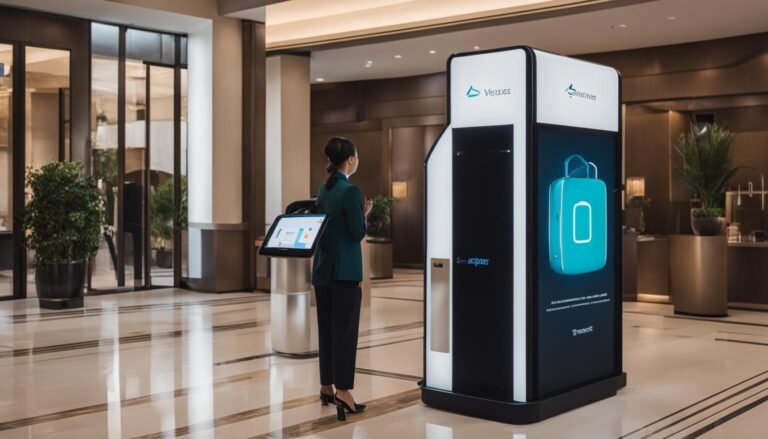The Impact of Mobile Technology on Guest Experience
Mobile technology has revolutionized the hotel industry, transforming guest experiences in numerous ways. The rise of mobile devices has drastically changed how people book travel, search for hotels, and engage with guest services. In this article, we will explore the ways mobile technology has improved guest satisfaction and delve into the trends shaping the future of mobile technology in the hospitality industry.
Key Takeaways:
- Mobile technology has greatly enhanced the convenience and personalization of the guest experience.
- Optimized websites and booking platforms have facilitated easy mobile bookings and reservations.
- Mobile check-in and check-out options streamline the process, reducing wait times.
- Direct communication through mobile apps enables guests to request services and ask questions conveniently.
- Contactless mobile payment options provide a secure and convenient way for guests to settle their bills.
Mobile Booking and Reservations
Mobile devices have revolutionized the way travelers book their accommodations, with online booking platforms optimized for mobile users providing convenience and efficiency. Whether it’s a last-minute reservation or a direct booking through a mobile app, guests can easily search for hotels, compare prices, and make reservations on the go. The availability of mobile booking and reservation options has greatly increased the volume of bookings, making it more accessible for travelers to secure their desired accommodations.
According to recent statistics, 70% of travelers who own a smartphone have used it to book their hotel stays. This indicates a significant shift in the way people plan and book their travel arrangements. The convenience of mobile booking platforms allows guests to make arrangements at their own pace, eliminating the need to rely on traditional booking methods.
“The rise of mobile booking platforms has transformed the booking experience for travelers, offering flexibility, convenience, and instant confirmation of reservations.”
Additionally, mobile booking platforms provide a seamless user experience, ensuring that the reservation process is simple and straightforward. Travelers can access detailed information about hotel amenities, room availability, and customer reviews, empowering them to make informed decisions. The ability to compare prices and read reviews on the same platform saves time and enhances the overall booking experience for guests.
| Benefits of Mobile Booking and Reservations | Challenges |
|---|---|
|
|
As mobile technology continues to advance, the future of mobile booking and reservations in the hospitality industry looks promising. With the integration of artificial intelligence and machine learning, mobile booking platforms can provide personalized recommendations based on user preferences, further enhancing the guest experience. Furthermore, the integration of mobile payment options and loyalty programs into booking platforms ensures a seamless and rewarding experience for guests.
Mobile Check-In and Check-Out
Mobile technology has not only revolutionized the way guests book their stay, but also how they check-in and check-out of hotels. With the advent of mobile check-in and check-out options, the traditional process of waiting in line at the front desk has become a thing of the past. Guests can now utilize their mobile devices to seamlessly complete these tasks, enhancing both convenience and efficiency.
Mobile check-in allows guests to skip the front desk altogether, saving valuable time and eliminating the need for physical interactions. Upon arrival, guests simply use their mobile app to check-in and receive their room assignment. This not only reduces wait times but also enables hotels to reallocate staff to other important tasks, improving overall operational efficiency.
Similarly, mobile check-out streamlines the departure process, allowing guests to settle their bills and leave the hotel without having to stop at the front desk. By providing a hassle-free check-out experience, hotels can leave a lasting positive impression on their guests, further enhancing overall satisfaction and loyalty.
To illustrate the impact of mobile check-in and check-out, let’s take a look at the following table:
| Traditional Check-In and Check-Out | Mobile Check-In and Check-Out |
|---|---|
| Long wait times at the front desk | Seamless check-in process via mobile app |
| Potential errors during manual check-in | Automated and accurate check-in process |
| Physical interaction with front desk staff | Reduced need for direct contact |
| Inflexible check-out times | Flexible check-out options |
As seen in the table above, mobile check-in and check-out provide numerous benefits for both guests and hotels. By embracing this technology, hotels can enhance the guest experience, streamline operations, and ultimately differentiate themselves in a highly competitive industry.
Mobile Communication and Guest Services
Mobile devices have revolutionized communication between guests and hotel staff, providing a seamless and efficient way for guests to access guest services and make requests. With the integration of messaging apps and chatbots into mobile apps, guests can easily communicate with hotel staff, enhancing their overall experience.
Whether it’s requesting room service, asking for extra amenities, or seeking information about local attractions, guests can now do so with just a few taps on their mobile devices. This instant communication eliminates the need for guests to wait in line at the front desk or make phone calls, saving them time and providing a more personalized and convenient experience.
The use of mobile apps for guest services extends beyond just basic communication. Many hotels now offer concierge services through their mobile apps, allowing guests to explore curated recommendations, book restaurant reservations, and receive personalized suggestions based on their preferences. This level of convenience and customization enhances the guest experience and fosters a stronger sense of satisfaction and loyalty.
Furthermore, mobile communication and guest services help hotels streamline their operations. By utilizing mobile apps, hotels can efficiently manage guest requests, track service delivery, and address any issues promptly. This not only improves the guest experience but also ensures that hotels can provide a high level of service to all their guests consistently.
In summary, mobile communication and guest services have become integral to the hospitality industry. By leveraging mobile technology, hotels can offer enhanced communication channels, personalized guest services, and streamlined operations. As the mobile landscape continues to evolve, hotels must embrace innovative solutions to meet the ever-evolving needs and expectations of their guests.
Mobile Payments and Billing
The advancement of mobile technology has brought about significant changes in the way guests pay for their hotel stays and additional services. With the increasing popularity of contactless payments, mobile payment options have become a convenient and secure alternative for guests.
By utilizing mobile apps, guests can easily make payments directly from their smartphones, eliminating the need for cash or credit cards. This contactless payment experience not only provides added convenience but also enhances safety and security, particularly in situations where physical contact may be limited.
In addition to offering contactless payment options, hotels can also implement virtual room keys and contactless check-in procedures through mobile apps. This further enhances the guest experience by reducing the need for physical touchpoints and interactions with hotel staff.
To better illustrate the benefits and trends of mobile payments and billing in the hospitality industry, the following table showcases the various payment methods available to guests:
| Payment Method | Description |
|---|---|
| Mobile Wallets | Guests can securely store their payment information in mobile wallet applications such as Apple Pay or Google Pay, allowing for quick and easy payments. |
| Mobile App Payments | Hotels can provide guests with their own mobile apps, enabling them to make payments for hotel expenses, room service, or amenities directly through the app. |
| Contactless Card Payments | Guests can use contactless-enabled credit or debit cards to make payments simply by tapping their cards on a payment terminal. |
| QR Code Payments | Using their mobile devices, guests can scan QR codes provided by the hotel to initiate payments through various payment apps. |
With the continued advancement of mobile technology, it is evident that mobile payments and billing will continue to play a significant role in the guest experience, offering convenience, security, and seamless transactions for both guests and hoteliers alike.
Personalized Mobile Apps and Loyalty Programs
Hotels are taking guest experiences to the next level by offering personalized mobile apps that provide a wide range of customized features and services. These apps not only enhance convenience but also offer a unique and tailored experience to each guest. Whether it’s ordering room service, exploring dining recommendations, or accessing information about local attractions, personalized mobile apps have become an essential tool in delivering exceptional guest experiences.
One of the key advantages of personalized mobile apps is their integration with loyalty programs. By using these apps, guests can easily track their loyalty points, access exclusive offers, and redeem rewards. This not only incentivizes guest loyalty but also fosters a sense of personalized engagement, creating a strong bond between the hotel and its guests.
The integration of loyalty rewards into personalized mobile apps allows hotels to gather valuable data on guest preferences and behavior. This data can be used to offer personalized recommendations and targeted promotions, further enhancing the guest experience. By leveraging the power of big data and analytics, hotels can gain insights into customer behavior and deliver highly tailored experiences that exceed expectations.
Benefits of Personalized Mobile Apps and Loyalty Programs
- Convenience: Personalized mobile apps provide guests with a one-stop solution for all their needs, from booking to accessing hotel services.
- Customization: These apps allow guests to customize their experience based on their preferences, making their stay more enjoyable and memorable.
- Rewards and Incentives: Integration with loyalty programs enables guests to earn rewards and enjoy exclusive benefits, encouraging repeat visits and brand loyalty.
- Data-driven Personalization: Hotels can analyze guest data to tailor services, promotions, and recommendations, ensuring a personalized and relevant experience.
“Personalized mobile apps have transformed the way hotels connect with their guests, providing a seamless and personalized experience that fosters loyalty and satisfaction.” – Industry Expert
As the hospitality industry continues to embrace mobile technology, personalized mobile apps and loyalty programs will play a crucial role in delivering exceptional guest experiences. By leveraging the power of data and customization, hotels can create unique and memorable stays that keep guests coming back for more.
Voice Control and Virtual Tours
The integration of voice-controlled devices and virtual tours in the hospitality industry has transformed the way guests interact with their hotel rooms and explore accommodations. Voice-controlled devices, such as Amazon Alexa or Google Assistant, provide a seamless and hands-free experience, allowing guests to control various room features and request services through simple voice commands. Whether adjusting the room temperature, ordering room service, or requesting information about local attractions, voice-controlled devices enhance convenience and accessibility.
Virtual tours, on the other hand, offer guests the opportunity to explore hotel rooms and facilities in a virtual and immersive way before making their booking decisions. Through interactive 360-degree images or videos, guests can get a realistic preview of what the hotel has to offer, from the comfort of their own homes. Virtual tours provide a unique experience, enabling guests to see every detail of a room or facility and helping them make more informed choices based on their preferences.
By incorporating voice-controlled devices and virtual tours, hotels can create a more personalized and interactive guest experience. These technologies enhance convenience, provide accessibility for guests with disabilities, and cater to the growing demand for digital and immersive experiences. As hotels continue to embrace these advancements, guests can expect a seamless blend of technology and hospitality that enhances their overall stay.
Benefits of Voice Control and Virtual Tours
- Hands-free convenience: Voice-controlled devices allow guests to control room features and request services without having to physically interact with switches or mobile devices.
- Immersive experience: Virtual tours provide guests with a realistic preview of hotel rooms and facilities, allowing them to visualize their stay before making a booking.
- Accessibility: Voice-controlled devices and virtual tours cater to guests with disabilities by offering an inclusive and user-friendly experience.
- Informed decision-making: Virtual tours enable guests to explore every detail of a hotel room or facility, helping them make more informed choices based on their preferences.
As technology continues to advance, voice-controlled devices and virtual tours will likely become even more integrated into the guest experience. By leveraging these technologies, hotels can create memorable and immersive stays that meet the evolving needs and expectations of their guests.
Big Data and Analytics
In today’s data-driven world, big data analysis plays a crucial role in the hospitality industry. Hotels are able to gather vast amounts of data through mobile apps, allowing them to gain valuable insights into customer behavior and preferences. By analyzing this data, hotels can make informed decisions to optimize room rates, target their marketing efforts, improve customer experiences, and evaluate their competitors.
Through big data analytics, hotels can understand guest sentiment and tailor their services to meet customer expectations. For example, by analyzing customer feedback and reviews, hotels can identify areas of improvement and implement changes to enhance the guest experience. They can identify trends in customer preferences, such as preferred room types, amenities, or dining options, and use this information to personalize the guest journey.
One of the key benefits of big data analysis in the hospitality industry is the ability to predict customer behavior. By analyzing historical data and patterns, hotels can forecast demand, optimize inventory management, and make data-driven decisions for pricing and promotions. This allows hotels to maximize revenue and provide tailored offers to specific customer segments.
Table: Customer Behavior Analysis
| Customer Behavior | Insights |
|---|---|
| Booking Patterns | Identify peak booking periods and adjust pricing strategies accordingly. |
| Preferred Amenities | Personalize room recommendations and promotional offers based on individual preferences. |
| Spending Habits | Target high spenders with exclusive offers and upsell opportunities. |
| Social Media Engagement | Monitor and respond to guest feedback and reviews to enhance reputation management. |
By harnessing the power of big data and analytics, hotels can unlock valuable insights that can drive business growth and improve the overall guest experience. With the advancements in technology, the amount of data available will continue to grow, presenting even more opportunities for hotels to leverage big data analysis to stay competitive in the ever-changing hospitality landscape.
Conclusion
Mobile technology has revolutionized the hospitality industry, transforming the way guests experience hotels. The convenience and personalization offered by mobile apps have improved booking, communication, payments, and overall guest satisfaction.
As we look to the future, the potential for mobile technology in enhancing the guest experience is immense. Advancements in voice-controlled devices, virtual tours, and augmented reality will provide even more immersive and interactive experiences for guests.
Hotels should embrace the latest trends in mobile technology to stay competitive. By leveraging big data and analytics, they can gain valuable insights into customer behavior, enabling them to tailor their services and offerings to meet guest expectations.
The future of mobile technology in guest experience holds exciting possibilities. With continuous innovation, hotels can provide exceptional service delivery, shaping the landscape of the hospitality industry and ensuring unforgettable experiences for guests.
Source Links
- https://medium.com/@phonesuitesdirect/mobile-is-changing-the-game-the-surprising-impact-of-mobile-devices-on-the-hotel-industry-85fcf76872db
- https://revenue-hub.com/how-mobile-technology-is-changing-the-guest-experience-at-hotels/
- https://www.quytech.com/blog/mobile-technology-changing-hospitality-industry/

